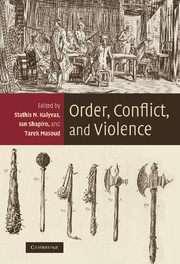Book contents
- Frontmatter
- Contents
- List of figures
- List of tables
- List of contributors
- Preface
- 1 Introduction: integrating the study of order, conflict, and violence
- Part 1 Creating, maintaining, and restoring order
- Part 2 Challenging, transforming, and destroying order
- 8 Civil wars and guerrilla warfare in the contemporary world: toward a joint theory of motivations and opportunities
- 9 Clausewitz vindicated? Economics and politics in the Colombian war
- 10 Articulating the geo-cultural logic of nationalist insurgency
- 11 Which group identities lead to most violence? Evidence from India
- 12 Order in disorder: a micro-comparative study of genocidal dynamics in Rwanda
- 13 Sexual violence during war: toward an understanding of variation
- 14 “Military necessity” and the laws of war in Imperial Germany
- 15 Preconditions of international normative change: implications for order and violence
- 16 Promises and pitfalls of an emerging research program: the microdynamics of civil war
- Index
- References
8 - Civil wars and guerrilla warfare in the contemporary world: toward a joint theory of motivations and opportunities
Published online by Cambridge University Press: 06 July 2010
- Frontmatter
- Contents
- List of figures
- List of tables
- List of contributors
- Preface
- 1 Introduction: integrating the study of order, conflict, and violence
- Part 1 Creating, maintaining, and restoring order
- Part 2 Challenging, transforming, and destroying order
- 8 Civil wars and guerrilla warfare in the contemporary world: toward a joint theory of motivations and opportunities
- 9 Clausewitz vindicated? Economics and politics in the Colombian war
- 10 Articulating the geo-cultural logic of nationalist insurgency
- 11 Which group identities lead to most violence? Evidence from India
- 12 Order in disorder: a micro-comparative study of genocidal dynamics in Rwanda
- 13 Sexual violence during war: toward an understanding of variation
- 14 “Military necessity” and the laws of war in Imperial Germany
- 15 Preconditions of international normative change: implications for order and violence
- 16 Promises and pitfalls of an emerging research program: the microdynamics of civil war
- Index
- References
Summary
The use of systematic and organized violence to effect political change is a generalized phenomenon around the world. Singer and Small (1994) put at 137 the number of civil wars that killed at least 1,000 during the period from 1820 to 1990. The death toll from civil wars fought after World War II has been estimated at a minimum of 16.2 million (Fearon and Laitin 2003). According to the data gathered by Banks (1997), between 1919 and 1997 there were over 500 spells of guerrilla warfare around the world. In the same period of time, close to 1,500 politically motivated assassinations or attempted assassinations of high government officials or politicians were committed – at a rate of one every three weeks. Banks codes a similar number of revolutionary or rebellious acts against the central government and about 4,000 political riots – or almost one per week.
A first generation of researchers working on the causes of political violence emphasized the presence of “structural” causes to explain civil wars and guerrilla warfare. Modernization scholars traced rebellion to economic inequality (Muller 1985; Paige 1975; Russett 1964) and the impact of economic modernization and the position or claims of particular social groups (Huntington 1968; Wolf 1969; Gurr 1973). A later line of research related violent conflict to ethnic nationalism (Horowitz 1985; Connor 1994).
- Type
- Chapter
- Information
- Order, Conflict, and Violence , pp. 197 - 218Publisher: Cambridge University PressPrint publication year: 2008
References
- 20
- Cited by



